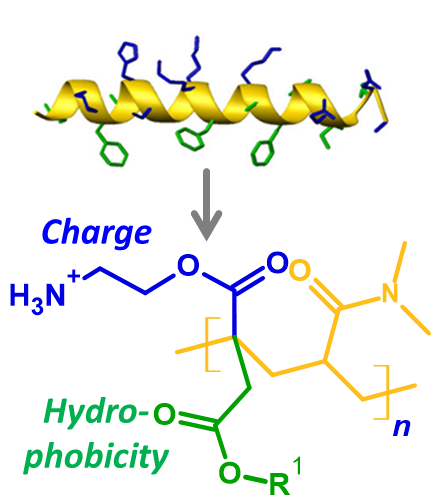Synthetic Mimics of Antimicrobial Peptides (SMAMPs)

Projektverantwortliche: Lea Sollka
Antimicrobial peptides (AMPs) are found in many organisms and act as nature’s first line of defence against pathogens. Many AMPs are facially amphiphilic and cationic, and can attach to pathogen cell envelopes in an unspecific way. Synthetic Mimics of Antimicrobial Peptides (SMAMPs) are synthetic polymers in which the key features of AMPs – cationic charge and hydrophobicity – and imitated. By this design, similar properties, including high antimicrobial activity, low mammalian cell toxicity and a low propensity for resistance to antibiotics, are obtained. We have been demonstrating that SMAMPs can work both as antibacterial drug and as material coatings in the past years. In the current project, SMAMPs based on itaconic acid are synthesized. The properties of these polymers depend on their precise molecular structure and molecular weight. If their properties are well controlled, the molecules are able to selectively kill bacteria but not mammalian cells and are therefore promising antibiotic alternatives. The project is funded by the BMBF (ProMatLeben – Polymere, link https://promatleben.de/de/)
Neuere Veröffentlichungen:
- Progress in the Free and Controlled Radical Homo- and Co-Polymerization of Itaconic Acid Derivatives: Toward Functional Polymers with Controlled Molar Mass Distribution and Architecture https://onlinelibrary.wiley.com/doi/full/10.1002/marc.202000546
- Surface-Attached Polymer Networks Made from Cationic Poly(diitaconates): Synthesis, Surface Characterization, and Bioactivityhttps://onlinelibrary.wiley.com/doi/full/10.1002/macp.202200323
